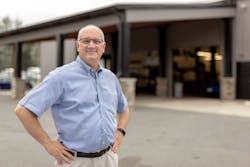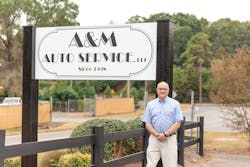It’s safe to say the backup plan has turned out pretty well for R. ‘Dutch’ Silverstein.
Silverstein is a former airline pilot who’s carried some of the lessons he learned in that field over to his current role as president of A&M Auto Service in Pineville, North Carolina.
He’s built the business on safety, accountability and attention to detail after learning at an early age he liked ‘to fix stuff’, beginning with repairs on bicycles and lawnmowers before becoming a small engine mechanic with Sears.
After becoming a pilot, Silverstein says things weren’t always so smooth.
“In aviation, you always had to have a backup because aviation is incredibly cyclical,” Silverstein says.
The worlds collided when he went to buy a lawnmower while in full uniform after coming off a trip and began talking with a salesman, whom he learned was a former captain with Eastern Airlines.
“When Eastern Airlines went out of business, he was left with nothing, so at that point, I became consumed with my backup plan,” Silverstein says.
He says he started by ‘dabbling’ in auto repair in 1996 before putting more effort into it in 1998.
“I worked seven days a week for nine years without taking a day off,” Silverstein says. “If I was sick, obviously, I was sick and couldn’t work, but I knew that with layoffs and furloughs and the economy, that having a family, I didn’t have the luxury of not being able to provide. Accordingly, I started repairing cars out of my house, and then from there, rented a space from a friend of mine who had a shop and just kept on working.
“I’d fly for 19 to 21 days a month and then come back during the first couple of years and occasionally sleep in my car to take care of the customers that would wait for me because there was no pressure,” Silverstein continues.
“I still had a family to provide for, so I just continued to do what I was doing, just did it on a larger scale–went from one bay to two, two bays to seven,” he says. “Now we’ve got eight lifts, seven bays.”
Moving into auto repair full-time also brought some challenges for Silverstein.
“Although I graduated college with a business degree, I didn’t have real-world business experience, and what I did was I made a lot of mistakes,” he says with a laugh. “I was good as a diagnostician. I could do the work. That wasn’t the problem, but in so far as actually running the business and knowing what to charge, how to charge, how to deal with customers successfully, how to present information so that they could understand better.”
Silverstein says he used his experience as a flight instructor to help with that part of the job, but he says he was discouraged by ‘the lack of professionalism and standardization in the automotive world’ with the exception of franchise shops.
“At the airline, when I was in the left seat as captain, I was responsible for everything–I mean everything,” he says. “We used to have a saying which was that you could delegate all the authority in the world to somebody else, but none of the responsibility.’ In this profession … that lack of accountability still exists. Now it’s slowly changing, but people don’t want to be held accountable, and it goes from line techs to management to suppliers, vendors.”
He says there’s also a major difference between the airline and auto repair industries.
“There was constant testing to determine that you were and could do what you said you could do (with the airlines),” he says. “There’s none of that in automobile repair. There isn’t. You want to call yourself a mechanic, it’s not a problem. You just go out, tell people you’re a mechanic and start working on stuff. You could never do that (in the airlines).”
But being a pilot helped Silverstein establish some cornerstones to his business–safety and accountability.
“It doesn’t matter to me if it’s going to be a single person who’s going to be driving their Honda Accord or it’s going to be a 767 with 210 passengers,” he says. “It doesn’t matter to me. The responsibility for safety is the same.
“My first consideration is safety above and beyond anything else,” he continues. “The second is accountability with regard to being accountable as a shop owner for the actions that happen in the shop. It’s my business, and I hope to have imparted some of that accountability and sense of obligation to my staff. But can I guarantee it? No. I just try to set a good example with it.”
Silverstein says another reason for his businesses’ success comes from ‘no pressure sales.’
“I don’t employ salesmen,” he says. “I’m not a salesman. I’m an advocate. The people that I employ are advocates. We put people first, and then the money follows. We don’t put money first.”
“If there’s something that we see during a comprehensive 30-point courtesy inspection that requires service or attention, we simply bring it to the attention of the owner and let them make a pressure-free decision about their property, and once you start doing that, it’s amazing the amount of people (who) hear about it,” he continued.

